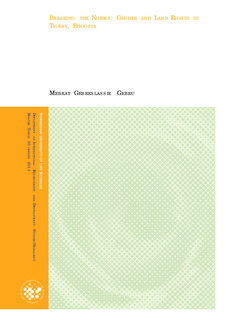Breaking the norms : gender and land rights in Tigray Ethiopia
Master thesis
Permanent lenke
http://hdl.handle.net/11250/187759Utgivelsesdato
2011-09-28Metadata
Vis full innførselSamlinger
Sammendrag
Rights to land determine the bargaining power of women in the society and the household, as
well as determining their economic condition. Control to land and efficient use of the land is
determined by the availability of resources and existing social and institutional structures.
This study was aimed to assess the importance of land for the economic, social and
empowerment change of the women, and the women’s access to resources and control over
land and produce of land. The study was carried out in two weredas of Tigray region, Ethiopia
and mainly employed household interviews, focus group discussions and cases studies.
The study revealed that land rights have given the women improved social-, economic-,
bargaining-, and empowerment- status in the household and in the society. The study also
identified that oxen, lack of labor, cultural norms, lack of proper documentation on land title
as main constraints the women face. In particular, female headed households lack control over
the produce of land; the constraints as mentioned have forced many to sharecrop-out their
land. When other sharecrop their land, they lose half to two third of the harvest (produce of
the land). Compared with male headed households, female headed households are trapped by
the lack of resources and lack of control over resources. The research also found out that
because not being able to benefit the full product of the land forces women to break cultural
taboos, e.g. that women are not allowed to plough. But this in fact, just adds to the already
numerous burdens of the household.
Moreover, the rights to land have improved the women status to claim their land but still the
women have difficulties in claiming land due to lack of financial capacity and improper
documentation. Lack of certificate is identified as one of the reasons putting women in a
disfavorable position when situations such as disputes over land or marital divorce occur.
Women in male headed households are disadvantaged as the certificate is given to the named
head of household, which is obviously the husband. Thus, women preferred to have individual
certificates, or wished that their names should appear on the certificate.
Land rights improve livelihoods of women and strengthen their claims over land. However,
this is being challenged by the fact that the households, particularly female headed
households, lack non-land resources such as oxen, labor and so on that restrict the efficient
and effective use of their land and lack of legal issues that limits claim over land.
